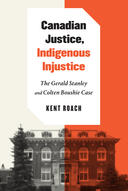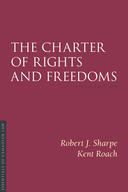Law Housing & Urban Development
Regulating Traffic Safety
- Publisher
- University of Toronto Press
- Initial publish date
- Aug 1990
- Category
- Housing & Urban Development
-
eBook
- ISBN
- 9781442679177
- Publish Date
- Aug 1990
- List Price
- $51.00
Add it to your shelf
Where to buy it
Description
Traffic accidents are responsible for the greatest number of deaths each year for many age groups. At present, authorities rely heavily on policing and prosecutions to control accidents. The authors of this work examine the effectiveness of these and other techniques, and suggest alternatives that may provide better results.
They particularly favour an epidemilogical approach that takes driver conduct as a given and looks for other ways to control the frequency and severity of accidents. They examine the use of rewards to encourage good driving and the use of licensing to control the exposure of high-risk drivers. The deterrent effect of civil liability and the question of no-fault insurance are also considered, as are various methods used to control drinking and driving.
The authors conclude by asking for greater evaluation of the interventions used. Traffic safety research, they argue, has barely begun to confront the central policy issue: how can society get the greatest payoff from the marginal dollar spent to prevent accidents?
About the authors
Martin L. Friedland is University Professor and Professor of Law Emeritus at The University of Toronto. He was made an Officer of the Order of Canada in 1990, and was awarded the Molson Prize in 1995.
Martin Friedland's profile page
Kent Roach is a professor of law and the Prichard-Wilson Chair of Law and Public Policy at the University of Toronto Faculty of Law. He is a graduate of the University of Toronto and of Yale University, and a former law clerk to Justice Bertha Wilson of the Supreme Court of Canada. Professor Roach has been editor-in-chief of the Criminal Law Quarterly since 1998. In 2002, he was elected a Fellow of the Royal Society of Canada and in 2013 he was one of four academics awarded a Pierre Elliott Trudeau Fellowship. He is the author of twelve books, including Constitutional Remedies in Canada (winner of the Walter Owen Prize); Due Process and Victims’ Rights (shortlisted for the Donner Prize); The Supreme Court on Trial (shortlisted for the Donner Prize); Brian Dickson: A Judge’s Journey (winner of the Dafoe Prize; co-authored with Robert J. Sharpe); and The 9/11 Effect: Comparative Counter-Terrorism (winner of the David Mundell Medal). He is the co-editor of several collections of essays and published casebooks, including most recently Comparative Counter-Terrorism Law, which arose from his role as General Reporter on Counter-Terrorism Law for the XIX International Congress on Comparative Law held in 2014. With Justice Robert Sharpe, he is the co-author of The Charter of Rights and Freedoms volume in Irwin Law’s Essentials of Canadian Law series. False Security: The Radicalization of Canada’s Terror Law, co-authored with Craig Forcese, was published by Irwin Law in 2015. He has also written over 200 articles and chapters published in Australia, China, Hong Kong, India, Israel, Italy, Kenya, Singapore, South Africa, Sweden, the United Kingdom, and the United States, as well as in Canada. Professor Roach has served as research director for the Inquiry into Pediatric Forensic Pathology in Ontario (the Goudge Inquiry) and for the Commission of Inquiry into the Investigation of the Bombing of Air India Flight 182. In both capacities, he edited multiple volumes of research studies. He served on the research advisory committee for the inquiry into the rendition of Maher Arar and the Ipperwash Inquiry into the killing of Dudley George. He was a special advisor to the Truth and Reconciliation Commission on Residential Schools. Professor Roach has represented Aboriginal and civil liberties groups in many interventions before the courts, including Gladue, Wells, Ipeelee, and Anderson on sentencing Aboriginal offenders; Latimer on mandatory minimum sentences; Stillman, Dunedin Construction, Downtown East Side Sex Workers, and Ward on Charter remedies; Golden on strip searches; Khawaja on the definition of terrorism; and Corbiere and Sauvé on voting rights. He is the faculty lead for the Asper Centre for Constitutional Rights.
Michael Trebilcock holds the Chair in Law and Economics in the Faculty of Law at the University of Toronto.
Other titles by

Toronto Campus Guide, 2nd edition
2nd Edition
Notes To the Univ of Toronto:A History

The Constitution of Canada
An Introduction to its Development and Law

Notes to the University of Toronto
A History

The University of Toronto
A History
The Death of Old Man Rice
A True Story of Criminal Justice in America

Securing Compliance
Seven Case Studies
Sanctions and Rewards in the Legal System
A Multidisciplinary Approach

The Case of Valentine Shortis
A True Story of Crime and Politics in Canada
Cases and Materials on Criminal Law And
Other titles by

Wrongfully Convicted (Updated and Expanded Edition)
Guilty Pleas, Imagined Crimes, and What Canada Must Do to Safeguard Justice

Canadian Justice, Indigenous Injustice
The Gerald Stanley and Colten Boushie Case

Criminal Law, 7/e

False Security
The Radicalization of Canadian Anti-Terrorism

Criminal Law, 6/e

Acting for Freedom
Fifty Years of Civil Liberties in Canada

Acting for Freedom
Fifty Years of Civil Liberties in Canada

The Charter of Rights and Freedoms, 5/e
Criminal Law 5/e

Forensic Investigations and Miscarriages of Justice
The Rhetoric Meets The Reality


